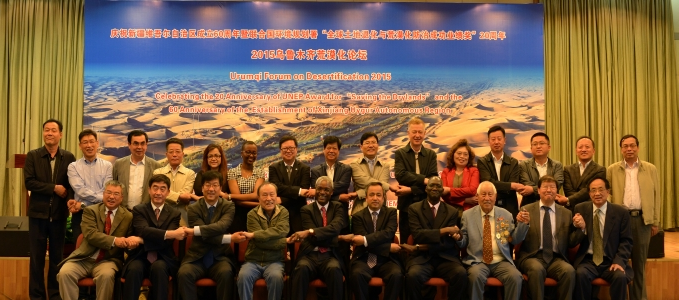Urumqi Forum Highlights Achievements in Combating Desertification
2015-06-04
Celebrating the 20th Anniversary of UNEP Award for "Saving the Drylands" and the 60th Anniversary of the Establishment of Xinjiang Uygur Autonomous Region
Urumqi, China, 3 June 2015 - The 2015 Urumqi Forum on Desertification was held yesterday, celebrating the 20th anniversary of "Saving the Drylands" award, granted by the United Nations Environment Programme (UNEP) to projects in the region, and the 60th anniversary of the establishment of Xinjiang Uygur Autonomous Region (XUAR).
Attended by over 150 participants, the event came ahead of the World Environment Day this Friday and the World Desertification Day later this month. It highlighted the achievements of the Xinjiang Institute of Ecology and Geography (XIEG) of the Chinese Academy of Sciences (CAS) in combatting desertification in the region. The Institute was recognized by UNEP in 1995 with the "Saving the Drylands Award" for its outstanding contribution in combating desertification and controlling land degradation in dryland environments.
The region has devised innovative solutions to combat desertification, including the "Great Green Wall" - a line of specially selected trees cutting 436 kilometres into the desert, protecting the regions beyond it from sandstorms and preventing the desert from spreading. This and other projects introduced in the region have allowed for a high-level of agricultural production, and increased income of the local communities in the Taklamakan Desert.
Xinjiang Uygur Autonomous Region is the largest province in land area in China accounting for 1/6 of the territory. It is host to the second largest desert in the world - Taklamakan Desert - and has been designated the Core Area of the Silk Road Economic Zone. Desertification being a major environmental issue in the region, the Xinjiang Institute of Ecology and Geography has been working on counter measures since the 1960's which earned them two UNEP Awards for Saving the Drylands in 1995.
"I am extremely impressed by the work that has been done here on combating desertification in the region, by the authorities and by the Chinese Academy of Sciences despite the challenges of size, diversity of ecosystems, and the complexity of issues that are being dealt with." said Mr. Ibrahim Thiaw, Deputy Executive Director of UNEP during his opening statement.
"Drylands are not dead lands, we should not abandon them, rather we should value and invest in them as they are of extreme importance to humanity and the environment," he added.
"UNEP-awarded projects from Xinjiang did more than planting a tree 20 years ago, they planted a new culture and instigated a new way of thinking that it is possible to recreate and restore nature even in the harshest conditions. Thanks to the many efforts here, a change is being seen in deforestation rates worldwide," he concluded.
Mr. Thiaw commended the Institute on the significant achievements made in transferring knowledge, technology and good practices on desertification control to other developing countries, stating that China is leading the world in desertification control and reforestation.
Mr. Aierken Tuniyaki, Vice Chairman of the People's Government of Xinjiang Uygur Autonomous Region stressed in his opening remarks that Xinjiang is sparing no efforts in combatting desertification and will continue to do so, improving people's livelihoods and advancing economic development in a sustainable way to generate harmony and stability in the region.
Prof. Cao Jinghua, Deputy Director General of Bureau of International Cooperation, CAS speaking on behalf of the Vice President of CAS, Mr. Yaping Zhang, extended special thanks to the researchers of the Institute for all their efforts to combat desertification. He noted that Chinese efforts have contributed significantly to global action on desertification through its various projects and initiatives, such as creation of botanical gardens, encroachment of rivers, setting up field monitoring stations.
Prof. Chen Xi, Director General of XIEG stressed that the UNEP awards have been a significant encouragement to continue their work and have created new opportunities for collaboration with UNEP, particularly with the newly established International Ecosystem Management Partnership.
Prior to the Forum, Mr. Thiaw met with the Governor of XUAR, Mr. Shohrat Zakir and congratulated him on the occasion of the Autonomous Region's 60th anniversary. They exchanged views on combating desertification and restoring degraded drylands, recognizing and appreciating the role of the Great Green Wall in desertification control. They also touched upon cooperation on clean energy, China-African cooperation and climate change.
The Forum was sponsored by Xinjiang Uygur Autonomous Region (XUAR), Chinese Academy of Sciences (CAS) and United Nations Environment Programme (UNEP). It was organized by the Xinjiang Institute of Ecology and Geography (XIEG) and UNEP-International Ecosystem Management Partnership (UNEP-IEMP). (UNEP News Centre)

Participants of the 2015 Urumqi Forum on Desertification



